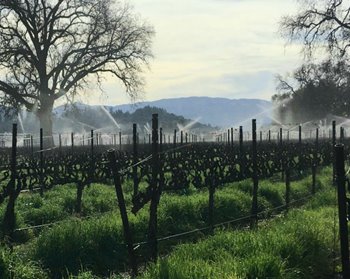Ukiah’s new water recycling facility is a win for local farmers and the environment
.png?sfvrsn=ca52a9c9_1) The city of Ukiah has completed the first three phases of a new water recycling facility which provides an additional 1,000 acre-feet per year of water to the Ukiah Valley. The project addresses several local needs including meeting regulatory requirements that limit the city’s wastewater discharge to the Russian River. It also creates a more diversified and drought resilient water supply and provides water for agricultural uses like irrigation and frost protection.
The city of Ukiah has completed the first three phases of a new water recycling facility which provides an additional 1,000 acre-feet per year of water to the Ukiah Valley. The project addresses several local needs including meeting regulatory requirements that limit the city’s wastewater discharge to the Russian River. It also creates a more diversified and drought resilient water supply and provides water for agricultural uses like irrigation and frost protection.
The recycled water system includes nearly 8 miles of pipeline, a 66 million gallon water storage reservoir, upgraded treatment facilities, and improved water and wastewater infrastructure. This allows Ukiah to serve approximately 325 million gallons of water to farmers, parks, and schools each year. If needed, the project can be expanded in a final fourth phase in future years, which would provide up to 400 acre-feet additional water per year.

Ukiah now has about 30 percent of its water portfolio coming from the recycled water facility. That has greatly increased the stability of its water supply, while reducing diversions from the Russian River which helps protect fisheries.
The water recycling facility also supports the region’s vibrant agricultural industry by providing water for frost protection. One of the most effective ways to protect grapevines from freezing is to use overhead sprinklers that continuously spray water on the vines and protect the fragile shoots.
However, frost protection uses 55 gallons of water per minute per acre, so being able to use recycled water saves about 14 million gallons of water that stays in the river for each typical frost event in Ukiah.

“This project has been a win all around, and that’s hard to come by,” said John Thomas with Thomas Vineyards. “The fish are happy with more river water, the state is happy with conservation, the city is happy with meeting its requirements for water quality, and the farmers are happy to receive reliable water supplies.”
“The city of Ukiah has been great to work with on this project and we’ve developed a very easy, positive partnership,” said Ukiah grape grower David Koball. “The most important benefit for me is the confidence that I will have reliable access to water when I need it, regardless of the rain levels. Right now we’re in a drought year looking at low flows in the Russian River. Fortunately, the recycled water deliveries will help many farms avoid catastrophic losses.”
Both Thomas and Koball noted that they have experienced significant cost savings because their electricity bills decline dramatically when they can rely on recycled water and do not have to run pumps to pull in river water to irrigate and protect their vineyards.
Looking ahead at growing population demands, many cities are embarking on infrastructure modernization projects to ensure water reliability. They are also taking a long view and designing these projects with climate change in mind. As droughts and warmer temperatures become more common, cities are the front lines working to ensure their constituents have a sustainable source of water now and into the future.
The Cal Cities #LocalWorks initiative shines the spotlight on examples of local actions that are making a difference to their communities. Show how #LocalWorks in your community by contacting communications@calcities.org.
